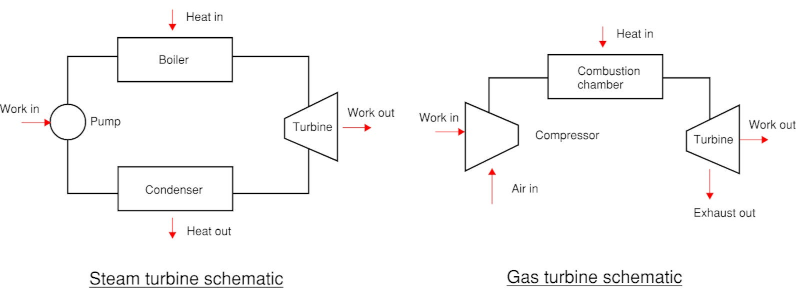It is an interesting fact that the most efficient way to generate electricity — at least so far — is to spin the shaft of a generator. The only real question is how you spin it. Falling water works. Heat from a nuclear reaction is another choice. For many decades, the king of the hill was steam. Now, however, gas turbines rule the electric generator landscape, and [Construction Physics] explains why in a recent post.
With a steam turbine, something burns or otherwise generates heat that boils water. The steam spins the blades, which turns the generator. With a gas turbine, the system compresses air and mixes it with gas. The hot gasses then drive the turbine, which is more efficient than using the combustion to produce steam.
Turns out, the idea for the gas turbine is very old, but material science had to catch up to be practical. Inefficient compressors led to low operating pressures, which was good, in a way, because the materials couldn’t stand the heat and pressure. However, low pressures led to inefficient turbines that were not practical.
The post is long and covers a lot of details about Carnot, Brayton, and Rankine cycles. It is a fascinating read, and we learned a few new things. Bet you will, too.
Turbines are a little like jet engines, but they transfer more power to the turbine blade instead of generating thrust. Turbines show up in odd places today. Some odder than others.

















https://fusionflight.com/arc/
Fusion Flight has a production model hand carry gas turbine generator that can be linked to run in parallel with other units for increased output.
Says they run on a diesel and lubricant oil mix at a 90:10 ratio. Feeding a battery bank they might be a viable option as range extenders for EV trucks.
Power to weight is better than a piston engine, but the trade off is fuel burn rate. Makes me wonder what the min-max plots would look like for optimization.
Hmm, maybe we could just replace the batteries and run the truck straight off the gas turbines;)
That’s a 9:1 ratio. ^^
So you are telling me the smartest vehicle should probably run on propane turbine generator and be a hybrid? I wish somebody would get on that. The only person I’ve ever heard talk about a Propane hybrid is Edison motors from Canada, they said a customer in Washington (state?) Was inquiring.. that was likely piston based.
My big problem is the noise. I am cursed with ultrasonic hearing and headaches. I van hear the inverters whining in a lot of hybrids already.
Right. Decimal points. I am ashamed.
You’re right about the noise though, that whine gets old quick.
Although I just realized I can let the vehicle self-charge while I’m shopping/working 😆, then I don’t have to listen to it.
Actually high frequency noise is pretty simple to muffle with, well, muffler/silencer plus you can use regenerative muffler to increase output with excess heat from the turbine exhaust. Hell, you can go all “eco” and burn hydrogen (not so eco to produce), propane, and other mixtures that burn “green” or at least blue and than be super eco-smug. Way more then with thermodynamics-efficiency defying battery charging hybrid systems based on turbines.
“Everybody wants to rule the world”
-Tears for Fears
“crunch crunch crunch cronk”
– Shears of Gears
@Al “Most efficient way to generate electricity”
If you mean thermodynamic efficiency converting fuel to electricity, then fuel cells are much more efficient than a gas turbine or combined cycle gas turbine. For simple systems like hydrogen and oxygen or methane and oxygen you can get above 80% and the theoretical limit is close to 100%.
If you mean economically efficient in terms of “levelized cost of electricity” maybe spinning rotors do rule. It is very difficult to beat hydro on an ideal site. In 2023 PV is very competitive in terms of LCOE and spinning rotors are notably absent.
It’s not hard to beat hydro on an ideal location, it’s just impossible ! All kind of power generation are not qualified for racing with the hydro global efficiency. The downfact is mentioned directly: ideal location.
All the electric car owners “We are *saving* the environment”.
Guess not. All they have done is shift from directly burning gasoline for energy, to charging their EV with electricity produced by burning Natural Gas. Which might be even worse considering transmission loss.
The story might be different if it were a Nuclear Power Plant. Sadly Nuclear is a bad word in the US Power industry.
I’ve had a Renault Zoe EV since Feb 2017. In the UK we can choose a renewable energy or electricity supplier, which means that the electricity we use is billed to them to generate that amount of renewable energy (+future investments + maintenance).
This means that 95% of the energy I’ve used over the past 59000 miles has been provided by wind or solar, not natural gas (the other 5% is where I have to use pubic chargers). That’s approximately 11 tonnes (also approx 11 tons) of CO2 saved.
But even EVs charged by natural gas are cleaner than combustion cars because as per the article, gas turbines + EV motors are more efficient than Internal Combustion Engines.
https://www.transportenvironment.org/challenges/cars/lifecycle-emissions/
Good for you? I was clearly referring to the U.S. (even said so in my comment) and directly referring to this quote in the linked article: “80% of electricity in the U.S. is produced by Gas Turbines.”
“80% of electricity in the U.S. is produced by Gas Turbines.”?
Hunh? Where did you misread that from?
It’s more like 40%, and says so in the linked article
A top notch small diesel car emits around 130gco2/km (eu avg is 200g/km). The average us lng plant emits 436 gco2/kwhe including upstream losses, for ev’s we also include a 10% transmission loss, 10% charging loss, and 5%discarge loss, charging a tesla model y running at 0.172kwh/km, gives us 436g/kWh*0.172kwh/km / (0.9*0.9*0.95)= 97,5gco2/km. So still better.
Yeah, no. This argument has been thoroughly debunked. The efficiency of small ICE engines is terrible compared to grid scale generation.
I’ll get on the EV train when 1. It can go 500 miles on a charge OR 2. It can be fully recharged in 10 minutes and chargers are prevalent.
Until then no. Additionally seems really silly to pinch the proverbial pollution pennies when container ships are the ones losing the proverbial millions in polution.
Its perfectly reasonable to not want an EV until it reaches your distance and recharge time goals, but that doesnt make your claims any more valid or true.
you are failing to see the one good thing about an EV – the exhaust is not in the city. No local VOC, CO and NOx emissions…the ones whose effects you will see in your lifetime. That alone makes the worth it in big cities…
Yeah, just the fact of thinking that, is, for me, insane. Make more pollution with ev than ice but send the pollution far away from the original user to the land of other people….. pfff… keep your trash and deal with it, too easy to send it to others..
You know what is even more efficient than a gas turbine? A gas turbine and a steam turbine together. It’s called combined cycle. You take the leftover heat from the gas turbine and generate steam to spin another turbine. Improves cycle efficiency by another 20%
For the europeans here: Is a gas turbine also more efficient if using LNG regarding the whole supply chain?
with a steam co-generator? Definitely.
Lng, or any others gaz, are bad, speaking only on efficiency, in an ice. Problem of low propagation of the flame. But using a turbine is the way to use the maximum of power of a gaz. This will not change the maximum theorical efficiency of a turbine, aka 25% (pratical efficiency of an ice nowadays is betwen 30 to 40%), without cogeneration. Cogeneration on an ice on a car ( truck, train,….) are just impossible to do. Cogeneration on a stationary power plant is doable, but the transport of the calories outside the power plant is so inefficient that it’s never done, exception aside. With an individual power plant, cogen could easily be a game changer. But again, an ice would perform better than any turbine.
Efficiency of the supply chain of lng is a number we Will not have access to since politics are hardlely involved.
But again, the problem with electricity is transportation, with an efficiency of 40% ( yes, 60% loss). don’t believe me, just Go read the scientific papers from the edison-tesla figth. All numbers are there. I’ve laughed hard when I read 10% of transport efficiency on other comment. Again, Nicolas tesla must be rolling in his grave.
To comeback to the question, I don’t have any numbers, but I doubt that the global efficiency of electricity is affected more than 1% by the lng supply chain, on the case lng is coming by boat from abroad. Really less if lng is locally extracted. looking what equipment is used to do the job and the efficiency of it, it could be possible to estimate this numbers. But, personally, I will not waste my time on this, it could be the better supply chain of all times, if electricity is involved in the power supply chain, it can’t be efficient.
That’s why, Speaking of efficiency, on the global, You will never be able to beat a car with an ice with an ev, it’s theorical and pratical impossible.
You day 40% is the “practical” efficiency of ICE but in fact that is close to the maximum efficiency achieved. Slightly higher efficiencies are possible by running hotter exhaust gas temperatures but then the engines wear out much faster. Practical gas turbines run 46% but only at steady output near their maxumum power rating. That is why gas turbines don’ t make sense for vehicles that start and stop a lot, cars and trucks, but work great for aircraft that fly at relatively constant speed and power levels over 99% of the time. Combined cycle gas/stream turbines achieve over 60% efficiency but the size, weight and complexity of the equipment precludes use in a vehicle.
Small ICE engines are clearly the least efficient option. Rooftop solar charging an electric vehicle, my current setup, can be the most efficient and cheapest but the supply of EVs is not quite there yet. I bought a 10 year old Tesla with 80K miles on it for $28,000 and paid $15,000 for enough rooftop solar panels to charge it and run my house. I have a net metering set up so extra electricity generated in the day gives me credit I can use to charge my car at night from the grid. A comparable used ICE vehicle, like my wife’s 2013 Honda Accord, is about $15,000 and fuel for the next 10 years at $3 a gallon driving 20,000 miles a year is is another $17,000 or $32,000 plus maintenance. Maintenance in our ICE vehilce is far higher since my only expenses for the EV are tires, wiper blades and the cabin air filter while the Honda needs 2-3 oil changes a year, and the occasional belt or hose in addition to tires, wiper blades and cabin air filters. Also the $15,000 for solar panels covers my electric bill most months so only a fraction of that expense it attributsble to EV charging lets say it is 1/3 or $5000 plus the $28,000 cost of the EV equals $33,000. If I spend $100 a year on oil changes for 10 years then my costs for running an EV vs a ICE Honda Accord, both of which I own, are about the same. Due to the fluke of my getting free lifetime charging on the Tesla it is actually much cheaper to drive but not everyone can buy a used Tesla with free lifetime charging that transfers to the new owner.
The point is that EVs can make sense from an economic and energy efficiency standpoint now but not for everybody just yet. That will only get better as production scales up and technology improves.
It will always be more efficient and convenient from an engineering standpoint to have large central electrical generation when you are burning fuel to generate electricity. This is why we rarely run our houses and businesses off gasoline or diesel generators if a grid connection is available. Rooftop solar has started changing that equation particularly with net metering. Until recently battery tech was too big and heavy to compete when it came to powering cars and trucks but that has also changed fairly recently. From a strictly engineering standpoint EVs are now better in many ways (efficiency, pollution, mainteance costs) than ICE vehicles but economically they are only competitive in specific cases . . . for now.
46% efficiency for a turbine? Hehehehehe no way…..
Large power plant , convenient, yes efficient, hehehehehe never and never …
And Some people seems to forget how many power needed to make a solar panel VS how much it would produce during its life expectancy.
Made in china, so made with a good part of power coming from coal power plant.
Same with the battery. Look at the last battery factory in us with its personnel coal power plant…
And look at the official number for a coal power plant efficiency…
Global efficiency is the only efficiency that’s matter, and this include all aspect : making, maintening, refueling and refurbishing.
I don’t look on economics numbers when politics and market are involved. Artifiacially moving market price and taxe refund can make somethimg financially interesting,
but not efficient. And money is the last argument for ev owners when they begin to understand that it’s clearly one of the worst way to move a vehicle when the vehicle have a weight superior to a third of the cargo ( more or less the weight of a bicycle by adult transported)
And why we use turbine to generate electricity all over the world instead of ice? Again look the number and the scale problem with ice VS turbine : on big numbers it’s look easier to construct a turbine with hundreds thousands of horses power than an ice. it’s seems that noise is more easily manageable with the turbine. But it seems that efficiency is not on the table when politics rules the engineering.